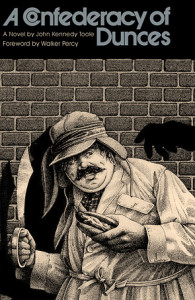 “When Fortuna spins you downward, go out to a movie and get more out of life,” said Ignatius J. Reilly, the fat, slovenly anti-hero of John Kennedy Toole’s A Confederacy of Dunces.
“When Fortuna spins you downward, go out to a movie and get more out of life,” said Ignatius J. Reilly, the fat, slovenly anti-hero of John Kennedy Toole’s A Confederacy of Dunces.
Set in mid-century New Orleans, the book features a menagerie of hilarious characters that revolves around the bombastic Reilly. Lover of medieval philosophy and detester of the modern era, Reilly lumbers from one misadventure to another, blowing his mother’s money on movies and hot dogs while writing a “lengthy indictment against our century.”
The book is laugh-out-loud funny, although the slapstick buffoonery tends to polarize readers: you will either love this book or you will hate it.
It has become a perennial cult classic of the American south: Confederacy won the Pulitzer Prize in 1981 when it was first published, 12 years after the author’s suicide. It would never have seen the light of day at all if Toole’s mother had not found a badly smeared manuscript after Toole’s death and spent ten years trying to get it published.
Toole is unsparing in his satire, lampooning everyone and everything: the gay aesthetes of Bourbon Street, black vagrant workers, white-trash neighbourhoods, hotdog vendors, strippers. He didn’t write an earnest indictment of the 20th century (that was, after all, Reilly’s pet project): he wrote a ribald hijinks of an indictment.
It leaves us with a picture of New Orleans, a city about which so much has been written, that is free of hackneyed stereotypes or sentimentality. His characters are all caricatures, larger than life and spitting their zany southern dialect.
But Toole’s genius gave them all troubles that we can recognize, character flaws that turn them into people that we feel that we know, perhaps even people who are parts of ourselves.
John Kennedy Toole must-read:
A Confederacy of Dunces
(Public Library Central Branch, Paperback Fiction)

